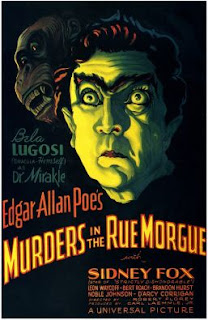Written by Tom Reed, Dale Van Every, "based" on a story by Edgar Allen Poe
Starring Bela Lugosi, Sidney Fox, Leon Waycoff (Leon Ames), Bert Roach.
IMDB Entry
I mentioned last week that Edgar Allen Poe rarely had his works translated to film faithfully. Part of that was the Poe worked in short stories, which need to be expanded to movie length, so writers would take a title and a few elements of the original and do what they pleased with it. Murders in the Rue Morgue is an early example.
It's set in Paris in 1845. Dr, Mirakle (Bela Lugosi) is kidnapping young women and injecting them with the blood of his sideshow ape Erik because reasons. It fails miserably, of course, and the bodies are dumped naked in the Seine. Pierre Dupin (Leon Waycoff) and his fiancee Camille (Sidney Fox) visit the sideshow where Mirakle is showing off his ape. The doctor becomes attracted to Camille and ends up visiting her. She is leery, so he has his minion kidnap her. Meanwhile, Dupin performs tests on the body of a dead prostitute and finds ape blood mixed in. Dupin becomes a suspect and they go in search of Mirakle before it's too late.
The movie is stagy and bears little resemblance to Poe's tale, other than the fact that Camille's mother is stuffed into a chimney. Again, Dupin's first name is changed for some reason to "Pierre." This attempts to ramp up the horror, but Poe's story is basically a mystery tale.
Bela Lugosi plays Mirakle in typical Lugosi fashion. Leon Waycoff does a good job with Dupin, though he's nothing like the character in the story, but rather an absent-minded student who keeps getting distracted by the search for the killer.``Bert Roach is notable as Dupin's friend and comic relief.
Director Robert Florey is best remembered today, if at all, as the director of The Coconuts, the Marx Brothers first film. He shot this with a nod to German expressionism. The job was given to him after he had been taken off shooting Frankenstein.
Aside from Lugosi, the most durable career was that as Leon Waycoff. A few years after the movie, he changed his name to Leon Ames and had roles in major films, most notable as Judy Garland's father in Meet Me in St. Louis.

